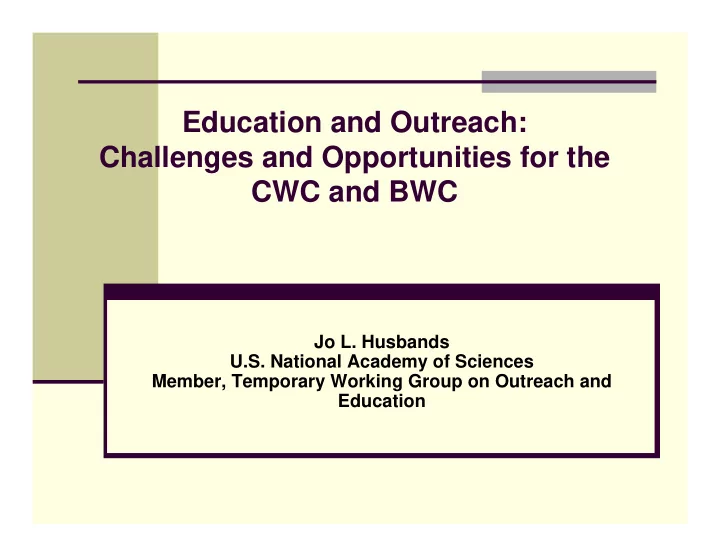

Education and Outreach: Challenges and Opportunities for the CWC and BWC Jo L. Husbands U.S. National Academy of Sciences Member, Temporary Working Group on Outreach and Education
CWC & BWC share common challenges in Education and Outreach � Above all, both face a significant lack of awareness among relevant stakeholders, including scientific communities � Potentially affects treaty implementation
Common challenges for education � Lack of access to effective teaching materials, to materials relevant to diverse audiences, and to materials in languages other than English � Lack of faculty/trainers prepared to teach about the Conventions and lack of opportunities to receive such training � Lack of resources and priority for including CWC or BWC as part of education for scientists; competition for space in the curriculum � Lack of “champions” to help raise priority and support providing resources
But Some Significant Differences � BWC has longer tradition of general support for education � Greater progress among BWC stakeholders, especially NGOs, toward addressing education needs � Specific interest and support from some States Parties � Only general references to education and outreach in reports of 1 st and 2 nd CWC Review Conferences � OPCW—IUPAC project in mid-2000s an exception � TWG an effort to address the challenges for the CWC
Opportunities for CWC and BWC in new emphasis on Responsible Conduct of Science � Compatible with disarmament/prohibition at the heart of the Conventions � Compatible with increasing convergence of S&T across the Conventions � Provides a framing that encompasses CW and BW � Topic gaining increased attention internationally (see list of resources) � Opportunity to work together on key aspects of Education and Outreach
Thank You! Jo L. Husbands U.S. National Academy of Sciences jhusband@nas.edu
Resource Materials on Responsible Conduct IAP/IAC (2012), Responsible Conduct in the Global Research Enterprise . � http://www.interacademycouncil.net/24026/28250.aspx. World Science Forum (2011). Declaration of the Budapest World Science Forum � 2011 on a New Era of Global Science. http://www.sciforum.hu/cms/upload/docs/programme/WSF_2011_Declaration_a dopted.pdf. ICSU (2011). Amendment to Statute 5: The Principle of Universality (Freedom � and Responsibility) of Science . http://www.icsu.org/about- icsu/structure/committees/freedom-responsibility/?icsudocid=statute-5. 2nd World Conference on Research Integrity (2010). Singapore Statement. � http://www.singaporestatement.org/. World Economic Forum (2008). Annual Meeting of New Champions of the World � Economic Forum: Tianjin Statement by the IAP Young Scientists . 2008.http://www.interacademies.net/Activities/Projects/IAPYoungScientistsProgr amme/13840.aspx ICSU Committee on Freedom and Responsibility in the Conduct of Science � (2008). Freedom, Responsibility and Universality of Science. http://www.icsu.org/publications/cfrs/freedom-responsibility-booklet/ICSU-CFRS- booklet.pdf. (formerly the ICSU Committee on Freedom in the Conduct of Science). UNESCO (United Nations Educational, Scientific and Cultural Organization). � 1999. Declaration on Science and the Use of Scientific Knowledge. World Conference on Science, Budapest, Hungary, June 26 ─ July 1. http://www.unesco.org/science/wcs/eng/declaration_e.htm.
Recommend
More recommend